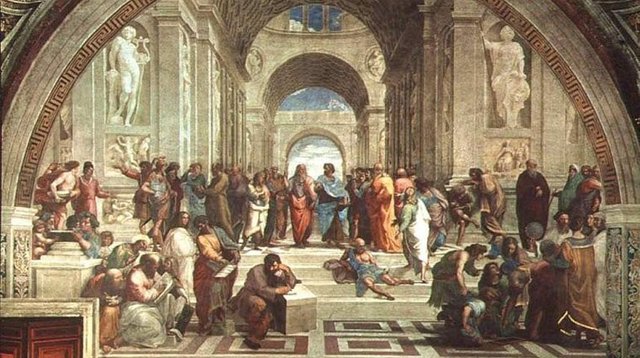Ancient philosophy. Anaximus - an attempt to synthesize the teachings of Thales and Anaxemander's teachings
As we can see in Anaxemander, there are the beginnings of various further philosophical teachings. Despite its geocentrism regarding the solar system, it already grasps the transience of the earth in terms of the uninterrupted without boundaries. He was the first of the ancients to conceive of it as a meteor, as a cosmic body in the world of space, which is already a whole revolution in comparison to the teaching of Thales. His thought of the birth and disappearance of the worlds, as a universal retribution, is great and profound. Finally, his teachings of evolutionary evolution in the realm of the animal kingdom of a new country comprehend the world as a unified world process in which everything comes from the immutable immanent laws of being. This is why some authors tend to be Anaxemander to be the true founder of philosophy.
The third representative of the Ionian School is Anaximus , born also in Miletus (590 AD and died in 525 BC). Nothing is known about his life and activities, except that he also wrote a philosophical prose work under the name: "periphyseos", "For Nature", which was soon lost. However, only one passage is preserved, as in Anaxemander. The teaching of Anaximus is an attempt to synthesize the teaching of Thales, which takes as its basis a substance and the teaching of Anaximander, which points to the boundlessness of the first beginning. He takes the essence of the world air for the main thought / air / which has a qualitative definition like water, but is also indefinite in space and has not evolved and does not disappear as Anaxemander's infinite. Anaximus says: "Like our soul, which is the air that sustains and sustains us, spirit and air envelop and hold all the cosmos." / Plutar, Opinions of the philosophers / Some later authors try to convey the essence of his teachings, Aristotle in his Metaphysics says: Anakimen and Diogenus say that the air is earlier than the water and that it is the simplest of the bodies ".
Simplici writes: "Anaximus , the son of Eurystrat and a friend of Anaxemander, says similarly to him that the substance underlying everything is one and infinite. But he does not say that it is indefinite in quality, but determined because it claims to be air (Physics-24,36). From it, he said, the things that were and will be, the gods and divine things, have arisen, while the other things come from his offspring. And the shape of the air is as follows: "Where he is even, there is invisible to our gaze; but cold and heat, moisture and motion make it visible. He is always on the move, because if he did not, he would not change as he is now. " The motion inherent in the air does not, according to Anaximus , lead to qualitative but only quantitative changes of the basic substance. The main processes that are performed in it are thickening-piknotis, expansions, thinning / manatis, oreosis /. By diluting the air becomes a fire, and as it thickens, it forms wind, clouds, water, earth and stones. All other substances are derived from these primordial air states, derived from its offspring. The compressed, compressed air forms the ground that is similar to a disk and is carried in the air. Similarly, other celestial bodies are maintained. The moist fumes, rising from the ground, spread out and ignite, forming the heavenly lights.
